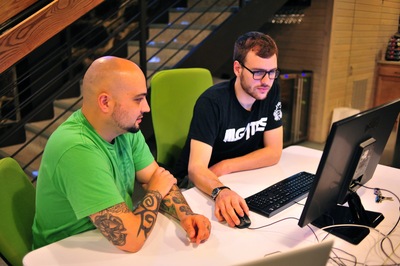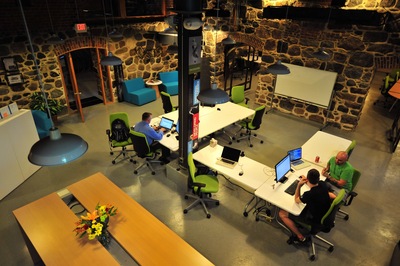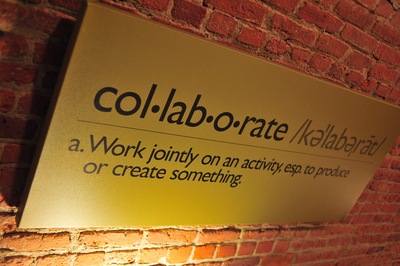Hackers unite: Ann Arbor joining dozens of cities in celebrating National Day of Civic Hacking
Ann Arbor is among dozens of cities across the country gearing up to celebrate the first National Day of Civic Hacking, a call to action for those who proudly call themselves hackers.
No, these hackers won't be trying to circumvent computer security systems to unleash catastrophe or crash financial markets. Rather, using publicly available data sets, they'll be working collaboratively to develop new applications that help improve society in some way.
"We're actively getting cooperation from city hall and the county, so the fond hope is that no one gets unpleasantly surprised by the results," said co-organizer Ed Vielmetti.
The A2 Hack for Change is scheduled to last from 9 a.m. to 6 p.m. Saturday and from 9 a.m. to 5 p.m. Sunday.

Eric Polerecky and Steve Koller, both software developers at Pillar, work inside The Forge on Thursday afternoon.
Ryan J. Stanton | AnnArbor.com
That could be anything from a mobile app drivers can use to report potholes to platforms that address food and housing distribution for those in need.
"I really want people to come with a fresh and open mind," said co-organizer Hans Kokx. "There'll be plenty of caffeine, food and great beer, and it'll be a good time."
Vielmetti said there will be a civic applications contest sponsored by A2Geeks, a nonprofit educational foundation that celebrates geek culture throughout the Ann Arbor area.
The contest aims to bring together government, citizens and software developers to build innovative systems based on public data.
"It should be a pretty good crowd," Vielmetti said. "I'm expecting people will show up with ideas of their own for building civic applications."
And if they don't have ideas of their own, Vielmetti said, that's no problem — there are more ideas being kicked around than organizers know what to do with.
"There's a bunch of municipal data that the city has already published — everything from the tree inventory database of every tree in the city to assessment data about people's houses and solar energy information," Vielmetti said, adding those kinds of data sets will be put to good use.
Kokx is predicting good results.
"If I had to guess, I would say we would have some sort of really phenomenal web app," he said, adding one idea already being kicked around is a map where people can punch in their own personal utility data, including how much they pay per month for utilities.
"And you can put in stuff about what you've done to improve the energy efficiency of your home, and you can zoom in and see where other people are at," he said. "And if you're two or three times the carbon footprint of them, you can go and see what they've done to lower their bill."

This will be the setting for this weekend's civic hackathon in Ann Arbor.
Ryan J. Stanton | AnnArbor.com
A number of federal agencies, including NASA, the Census Bureau, and the Department of Labor, are participating in the national event by offering specific challenges for hackers to tackle.
A showcase of projects that emerge from Civic Hacking Day will be featured at an event at the White House at the end of July, in tandem with President Obama's focus on STEM education.
"I suspect people are going to want to spend most of their time focusing on local issues," Kokx said of the Ann Arbor hackathon. "It's hard to say what people will do, though. I'm just here to bring them together and give them the tools. Lead a horse to water, so to speak."
Local sponsors for the Ann Arbor event include Pillar, Barracuda Networks, Zinio, A2 Hosting and A2Geeks.
Vielmetti, a staunch advocate for transparency in government, said anyone who wants to get involved is invited to become part of the civic hacker community, regardless of skill level or experience.
Those interested in joining in and doing some hacking are encouraged to bring their laptops, ideas about civic government and some data.

This poster will serve as inspiration for hackers this weekend.
Ryan J. Stanton | AnnArbor.com
Using data provided by the city and the county, he said, they just might come up with some solutions that could help, for example, with local sustainability initiatives.
"I don't know exactly what to expect," he said. "I'm very hopeful people with bright ideas will meet up with people with good coding skills and we'll get something done that's more interesting than what either one of them could have done by themselves."
Kokx said organizers of the A2 Hack for Change have a list of challenges they're going to suggest people consider this weekend. A curated list of challenges from federal government agencies and other national partners is posted at www.hackforchange.org/challenges.
Eric Polerecky and Steve Koller, both software developers at Pillar, were working inside The Forge on Thursday afternoon. They're both curious what might unfold over the weekend.
"They came in and did a presentation, which gave us an overview of what civic hacking is," Polerecky said. "I don't think many of us have a lot of experience in it, so it's really going to be an introduction to the type of data that's out there. I don't think we have a specific project yet that we're focused on, so it'll be pretty much a learning experience for all of us."
Koller said he saw from an internship he had a couple years back in Grand Rapids how public data sets can be leveraged to solve social challenges.
"It was a branch of a philanthropic organization, but they actually had access to U.S. census data and they would map the city out according to different factors," he said. "And that would help inform other nonprofits of where they could best serve the city."
- For more information on the Ann Arbor event, visit: http://www.a2hackforchange.org
- For more information about the national initiative, visit: http://hackforchange.org
- For public datasets, visit: http://www.hackforchange.org/datasets
- For hacker challenges, visit: http://www.hackforchange.org/challenges
Ryan J. Stanton covers government and politics for AnnArbor.com. Reach him at ryanstanton@annarbor.com or 734-623-2529. You also can follow him on Twitter or subscribe to AnnArbor.com's email newsletters.


Comments
Roger Rayle
Sat, Jun 1, 2013 : 1:59 p.m.
National Day of Civic Hacking is another step in the right direction... fact-based civic engagement and decision-making. Government is a key player in providing infrastructure and our governmental information infrastructure needs continual improvement. For those who want to see examples of how mashing up public data from various sources can enhance understanding of reality, watch Tim Berners-Lee's February 2009 TED Talk on open, linked data being the next big thing where he gets the audience to chant "Raw Data Now!" http://www.ted.com/talks/tim_berners_lee_on_the_next_web.html ... and check out the various Google Earth mashups of the Pall/Gelman 1,4-Dioxane contamination here: https://sites.google.com/site/srsworg/Home/images/pgsi-site-in-google-earth In the former, Berners-Lee includes mashups by Han Rosling of worldwide trends using United Nations development data aggregated by a company still headquartered here in Ann Arbor and celebrating its 50th anniversary this year. In the latter, interactive 2-, 3- & 4-D mashups use data and images from city, township, county, state and other public sources to depict what's happening locally with the Pall/Gelman dioxane contamination since 1986.
outdoor6709
Sat, Jun 1, 2013 : 11:49 a.m.
How about a data base of all the lies told in current scandals in Washington? Fast & Furious, IRS, spying on reporters, green energy companies, purchase of 1.6 billion (30 years worth of current usage) , failure to make a decision on Keystone pipeline, unwillingness to create jobs.
Stephen Lange Ranzini
Sat, Jun 1, 2013 : 10:52 a.m.
I propose the creation in Ann Arbor of a rotating public art gallery displaying the work of local artists. The artists would be selected via juried competitions open to all with the winners getting a four month show, so three a year. The art would include sculpture outdoors and other arts indoor. Electronic online bidding would occur for the duration of each show for each piece, with payment guaranteed via credit card, so the rotating public art gallery would need a website. The website would have links to artists and price information with some type of smart phone option that would make it easier for people to shop and purchase work or learn more about the artist. So the website would need an mobile phone app developed. There are many different options for locations for the rotating art gallery. As to locations, City Hall downtown might be a good spot for an indoor art gallery and the pocket park at Liberty Park on Liberty St. and/or the top of the Garage Mahal. In addition private businesses could get involved with locations like bank lobbies, vacant store fronts and downtown coffee stores. Also local parks could also be involved as sites to display art. We could organize citizens to lobby the city via an online petition that people could sign up to and pledge funds to via a www.kickstarter.com fundraising (the money isn't released unless the total minimum required is raised.). In addition to my day job at the bank, I actually am president and chairman of a IRS approved 501c3 non-profit, and it could form a new fund, to raise the money and administer the program. A committee to make this happen has already formed and if you are interested in getting involved or have some skills to offer the group that could help male it happen, please contact me at ranzini@university-bank.com.
Katherine Griswold
Sat, Jun 1, 2013 : 2:03 a.m.
Thanks to Ed Vielmetti and Hans Kokx for organizing this event. They gave an overview of the event a couple of weeks ago and generated an interesting discussion on possible projects. Similar to the biking/pothole application described by Kokx, I'm proposing a system to collect data on where people do not feel safe because their movement is impaired by overgrown vegetation or other items (utility boxes, fences, building posts) in their path or in their line of sight. For example, the new bike path on Green Rd already has low hanging branches. Given that many streets do not have sidewalks, and I am not advocating that all streets need sidewalks, data on whether pedestrians can step out of the roadway onto the right-of-way (beyond the curb) to avoid oncoming vehicular traffic would be helpful. I spoke at a recent Planning Commission meeting asking that the non-motorized plan incorporate a section on maintenance. Spending limited funds on non-motorized infrastructure then allowing it to become overgrow with vegetation seems to defeat the purpose. Also, a significant improvement can be made with minimal funding if streets, especially those without sidewalks or paths, have the right-of-way maintained per City Code. This is extremely timely given that Council recently authorized a sidewalk study and AAPS may be eliminating high school busing next year. As you may remember, the AAPS expanded the school walk zones to 1.5 miles last year. If we want to encourage more non-motorized travel, then we need to make it safer and protect our considerable investment in non-motorized infrastructure. This system will provide the data to support that objective.
DJBudSonic
Fri, May 31, 2013 : 11:25 p.m.
How about a database of all the city council votes, searchable by Council Member name, date, vote, agenda-bylaw-budget line item number etc. That way voters could find out who voted for what, and if they voted counter to a previous vote, and what the results of that vote was, or how it effected city policy, tax rates and the like. I find that many people I speak to are unaware of what is going on with their ward reps, if people knew what their reps did or didn't vote for it would give them a much clearer picture when they go to the polls this August and November. Perhaps it could be cross referenced to articles in Annarbor.com or other online publications?